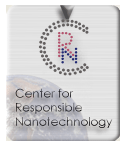PRESS RELEASE: JUNE 19, 2003
CRN Forms Board of Advisors
Taking a major step forward, the Center for Responsible Nanotechnology (CRN) has established a Board of
Advisors, including several well-known names. The first six members of CRN's Board of Advisors are Jose
Cordeiro, Eric Drexler, Jerry Glenn, Lisa Hopper, Doug Mulhall, and Rosa Wang. More advisors will be
added in
the near future, as CRN identifies and engages leaders in government, business, and civil society who share a
vision of nanotechnology being widely used for productive and beneficial purposes, with malicious uses
limited by
effective administration of the technology.
" We are proud to welcome such accomplished and respected figures to our
Board, " says Mike Treder,
Executive Director of CRN. " It's a great beginning. We aim to continue building a well-rounded Board,
with additional experts in fields beyond nanotechnology, such as economics, philosophy, sociology,
ecology,
and politics. We're committed to a globally representative mix, with members from all major world regions.
Jose Luis Cordeiro is President of the Sociedad Mundial del Futuro Venezuela,
and author of
The Great Taboo
.
An engineer and economist with expertise in global affairs, he is Director of the Club of Rome (Venezuela),
and an
international advisor to several companies and organizations. As Director of the Association of
Venezuelan Exporters (AVEX), he has participated in the
negotiations of the Free Trade Area of the Americas
(FTAA).
K. Eric Drexler, Founder and Chairman of the Foresight Institute, is a researcher concerned with emerging
technologies and their consequences for the
future. In the mid 1980s, he introduced the term
'nanotechnology' to describe
atomically precise molecular manufacturing systems and their products. His
research ranges from computational modeling of molecular machines to
engineering analysis of molecular
manufacturing systems and their potential products. Author of
Engines of Creation
and
Nanosystems
,
and
co-author of
Unbounding the Future
,
he lectures widely on molecular nanotechnology, its development, and its implications for the human future.
Jerome C. Glenn is the Executive Director for the American Council for the United Nations University, where he co-founded and directs the Millennium Project on global futures research. He has 30 years experience in
futures research with governments, corporations, and international organizations
working for the Committee
for the Future, Hudson Institute, Future Options Room, Millennium Project, and as an independent consultant.
He has written over 90 articles and authored, edited, or co-authored eight books on the
future.
Lisa Hopper is President and Founder of World Care, a non-profit organization dedicated to raising
consciousness in the education, health, environmental, and community service arenas. World Care converts
surplus into valuable resources for relief efforts throughout the world, creating opportunities for
those who are less fortunate by providing the necessary supplies.
Douglas Mulhall, author of
Our Molecular Future
,
is a leading figure in
global environmentalism. He has participated in designing, building, and
operating
water recycling and flood control facilities in China and Brazil, in cooperation with the European Commission
and multinational companies. A former
Managing Director of the Hamburg Environmental Institute, he is
cofounder and
director of O Instituto Ambiental, the first South American institute to
specialize in
wastewater recycling.
Rosa Wang is founder and principal of GeographicEngine.com, which offers
financial and strategic advisory to
non-profits. In addition, she serves as
consultant for Ashoka Innovators for the Public, a non-profit
organization
dedicated to the profession of social entrepreneurship. Rosa has extensive
experience in
finance and economic policy based in North America and Asia, and
her past employers include Dresdner RCM
Global Investors, Lehman Brothers, and
the Federal Reserve Bank of NY.
Since its formation in late 2002, CRN has attracted significant notice for
taking a strong stance on the
risks of unregulated molecular nanotechnology,
and the need for a coordinated international program of
development. CRN's
founders, Executive Director Mike Treder and Director of Research Chris
Phoenix, believe
that the humanitarian potential of nanotechnology is
enormous, but so also is the potential for misuse.
Their mission is to raise
awareness of the issues presented by nanotechnology: the benefits and dangers,
and
the possibilities for responsible use.
|
















